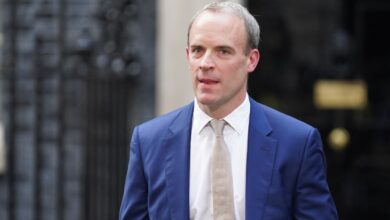Rishi Sunak urged to delay NI hike, as business warns rising costs will fuel inflation

Chancellor Rishi Sunak is facing new calls to delay his planned 2.5 per cent national insurance hike, as fresh research pointed to prices outstripping wages and companies warned of a “cost of doing business crisis”.
Meanwhile, campaigners warned that much of the money raised for social care from the tax rise will go to wealthy pensioners in expensive homes.
Almost three-quarters (73 per cent) of companies questioned in new research by the British Chambers of Commerce (BCC) said they will hike prices in response to rising costs, including spiralling energy bills and the NI increase coming into effect in April.
And a separate survey found that fewer than one in three workers expect their wages to keep pace with rising prices, in what the TUC described as “the worst pay squeeze in 200 years”.
The BCC called on the chancellor to help firms keep costs down by introducing a temporary energy price cap for companies to match the protection offered to households.
And the business organisation urged Mr Sunak to delay the introduction of the £12bn national insurance rise for a year to avoid fuelling the current cost-of-living crisis.
The NI hike – split evenly between employees and employers – will initially fund action to reduce the backlog of NHS treatments due to Covid as well as rises to nurses’ pay, but will eventually be split with the care system under the banner Health and Social Care Levy.
The BCC identified the levy as one of the key factors in what it termed a “cost of doing business crisis”, alongside rising prices for energy, raw materials and staff wages.
Some 73 per cent out of more than 1,000 companies questioned by the organisation said they were experiencing pressure to put prices up, with fewer than one in 10 (9 per cent) saying they were not. Half (50 per cent) said they were trying to cut costs and 18 per cent were reducing investment in response to the crisis.
BCC director general Shevaun Haviland warned: “Without help from the Treasury to weather this storm many businesses, especially smaller ones, will be faced with a nearly impossible situation that will leave them with little choice but to raise prices.
“Unabated, the surging cost pressures produced by the cost of doing business crisis will continue to lead to increased prices and fuel the cost-of-living crisis currently being faced by people across the country.”
The TUC warned that pay growth is weakening across the economy just as bills are set to skyrocket, with real wages falling by 1.4 per cent in the private sector and 2.4 per cent in the public sector in the year to November.
After inflation is taken into account, the average worker’s pay will fall by £50 a month in 2022, said general secretary Frances O’Grady.
The Britain Thinks survey of 2,200 workers for the TUC found that 63 per cent expect their wages to rise by less than inflation this year, while 18 per cent believe they will keep pace with rising prices and just 11 per cent outstrip them.
Rejecting the recent call from Bank of England governor Andrew Bailey for “moderation” in wage increases to rein in inflation, Ms O’Grady said: “Energy prices are pushing up inflation – not wage demands.
“The last thing hard-pressed households need right now is for their pay to be held down.”
She added: “Workers are suffering the worst squeeze on wages in more than 200 years. Britain needs a pay rise – not more pay restraint.”
Meanwhile, campaigners at Age UK warned that the flagship social care reform being funded by the hike will do nothing for less well-off elderly people, with most of the benefits going to the wealthiest.
“Patently unfair and regressive” changes introduced at the last minute will water down the planned cap on care costs so that poorer people are far less likely ever to reach the threshold for protection than their richer counterparts, said the charity’s director Caroline Abrahams.





